I intended to write up a post-op of my recent trip to Tolkien 2008 at the University of Vermont earlier this week, but I came back from the trip with an ugly cold. Doesn’t that always seem to happen when you travel these days! I’m beginning to feel a bit better now, though, so I thought it was about time.
The conference, as usual, was small, short, and wonderful. Personally, I have never felt that its brevity (really just one full day of papers) has been a disadvantage — take it from me: listening to ten papers, all on Tolkien, one after the other, really makes for a full day. Other conferences with more papers usually have to run concurrent sessions, which can make for some difficult choices. At UVM, you get to hear every paper. Also, the attendance is relatively small (perhaps 40-50 people), but that makes for a cozy atmosphere, where it’s much easier to strike up conversations with any and everyone. I wouldn’t trade it for a larger, semi-anonymous juggernaut like Kalamazoo, to be perfectly frank.
The conference actually begins Friday night with a fireside Tolkien reading and concludes Sunday morning with a panel of several “Undergraduate Voices” — neither of which have I ever managed to attend. There’s also a dinner for the speakers Saturday night, but I’ll leave that out as well. A topic for another post, perhaps. My report, therefore, must be limited to the papers presented on Saturday. And so, without further ado, here are a few thoughts on each one:

Jacob Seliger: The Paradox of Power and Defining Good and Evil in
The Lord of the Rings [read it,
here]
Jacob’s paper focused on the idea that there is a “paradox of power” in
The Lord of the Rings — that those most desirous of it are the least fit to exercise it, while those most fit to use power well are the least greedy to possess it. Jacob sets up a spectrum of representative characters, from Sauron, the Ring (treated as a personality), and Saruman, on the one hand, to Frodo, Gandalf, and Aragorn on the other hand. In a brief aside, he places Tom Bombadil in between. I felt that Jacob could have done a more thorough job of defining this “paradox of power” in his paper. Moreover, I felt that his choices of characters to demonstrate it were a bit obvious. His comparisons were valid, but they felt rather facile; I would have liked to see him dig a bit deeper. Additionally, the paper was situated firmly within the world of Middle-earth, but I think his thesis might have benefited from greater contextualization. That being said, I would like to congratulate Jacob on his first conference appearance! And hopefully not his last! :)
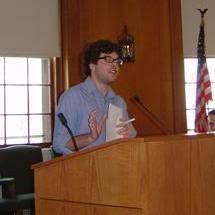
Thomas Turner II: “Their Fall Into Possessiveness”: Possessiveness, Imperialism, and Colonialism in Middle-earth
The imperialism/colonialism approach to Tolkien has been growing over the past few years, and it’s nice to see such new critical methodologies being deployed in Tolkien studies. For all that, Thomas’s paper felt a bit disorganized to me: many nice points, but not very well stitched together. I felt he failed to make convincing transitions between and connections among the three main parts of his paper. Moreover, a question I raised during the ensuing Q&A, I felt his use of the ravaged Shire, under the management of a displaced and defrocked Saruman, was not the best example of colonialism he could have chosen. Much better, Thomas referred to Númenórean colonization, but this was not the centerpiece to his argument. Even so, it was nice to hear mention of Aldarion and Erendis, a tale too often overlooked. Thomas’s reference to the displacement of the American Indian as well as the hunting of the American buffalo to near-extinction made for an interesting point, but one not optimally relevant to Tolkien. And finally, he cast Mordor as the metropole of colonialization in Middle-earth, with a not so veiled criticism of the British Empire — an apt analogy, but one, I fear, which would have made Tolkien shudder.

Michael Stanton: Tolkien in New Zealand
Michael (the author of
Hobbits, Elves, and Wizards) was a late replacement for Rebecca Addy, who was unable to attend the conference. His paper builds on a rather tenuous connection — that Samuel Butler and Tolkien, who could scarcely be more different, had one important belief in common: a mistrust of the so-called “myth of progress”. Both preferred the wild, untamed countryside to overpopulated, overmechanized industrial centers. Butler, moreover, lived and wrote in New Zealand, a country Tolkien never visited, but which Peter Jackson selected as the proxy Middle-earth for his recent film trilogy. Whatever Tolkien would have thought of the films themselves, we have to imagine he would have approved of the landscapes. Ironically, Jackson’s films suffer from a too wholesale subscription to that very myth of progress that Tolkien and Butler so decried. The paper works as a presentation piece, though I’m not sure there’s sufficient depth or substance for a publication. Be that as it may, Stanton delivered his paper with all the confidence of his many professional years, and I enjoyed listening to it.
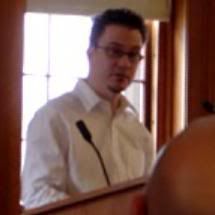
“The Jason Fisher Hour,” starring Jason Fisher … with your host, Jason Fisher :)
The next section was to contain my own paper and that of Elizabeth Kelly Martin. Unfortunately, due to the recent air travel imbroglio, Elizabeth couldn’t make it to the conference. This left me to deliver my paper, and then to weather a full-on Q&A directed entirely at myself alone. This was nice, in some ways (if intimidating in others), because rather than bouncing back and forth between presenters and their topics, I felt the Q&A allowed me to dig even deeper into my topic, developing a genuine dialogue on it. I got a few useful suggestions and ideas as well. Very productive. As to my own paper, the feedback I got was good, but I will leave it to others to comment on it in any further detail. (I believe one such commentary may be forthcoming.) For those who want a taste, here’s a video clip:
(Apologies for the quality of the “Zapruder film” here. And that lunar landscape you see in the foreground, which my friend Gary kept trying to avoid, belongs to our host, Chris Vaccaro. ;)
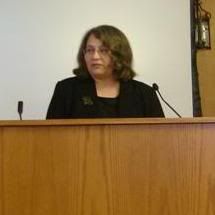
Anna Smol: Uncanny Landscapes and Experiences of War in
The Lord of the RingsThis was one of my favorite couple of papers at the conference. Extremely well constructed, well presented, and compelling. Anna’s basic thread was to define a notion of the “uncanny” in war — the genuine strangeness of a disembodied limb, for example, that seems to overwhelm coherent thought — and then to systematically demonstrate the use of the uncanny in
The Lord of the Rings. The incongruous power of the phrase “Landscape with Corpse” as the title of an art-piece is still lingering in the back of my mind. As I’ve come to expect from her, Anna marshaled an impressive array of historians, psychologists, and theorists to strengthen her arguments. If her paper was short on one thing, it was only in citing the known scholars of “Tolkien and War” — however, I learned after the paper that they were all indeed there (Garth, Croft, Hooker, and others), but that Anna had either relegated them to footnotes, or quoted them silently in the interests of time. Believe me: I can relate to the need to compress an idea to fit a 20-minute time slot. Look for an upcoming appearance by Anna in
Bodies of Light and Shadow: Corporeality and Embodiment in The Texts of Tolkien, edited by UVM’s own Christopher Vaccaro. Speaking of ...
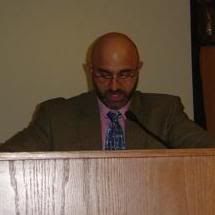
Christopher Vaccaro: The Whimsy Mode of
The Hobbit: The Comedic and Gruesome (paraphrase; does any remember the precise new title of Chris’s paper?)
Chris is one of the best public speakers I know. He has a great booming deep voice (see if you don’t think of Treebeard!) which is really just perfect for reading — especially in character — from
The Hobbit. His presentations of the two goblins’ songs were another great example (last year, he read a poem — I can’t recall the author at the moment — that worked just as well). The two poles in Chris’s argument this time around were the comedic elements of physicality and the gruesome ones, or more specifically, the transition from the former to the latter over the course of the novel. Chris also made an interesting analogy where the “Baggins” in Bilbo corresponds to the bodily (with all its carnivalesque flopping, flailing, and stomach-grumbling), while the “Took” in Bilbo represents his soul (with its acceptance — even welcome — of danger and risk in the name of adventure and maturation). The only disappointment was Chris’s inexplicably sudden conclusion: “(Pause) That wraps it up. Thank you.” That’s it? No, give us more! :)
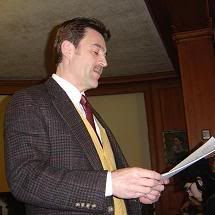
E.L. Risden: In Body, Out of Body: Tolkien’s Monsters, Norse Traditions, and the Conjunction of Spirit and Flesh
Ed Risden certainly knows his subject! You can take a look at some of his 1994 translation of
Beowulf here. Ed’s pronunciation, of Old English, Old Norse, and Tolkien’s own nomenclature*, was the best I heard at the conference — and among the best of any conference I’ve attended. He seems to be a man after my own heart in that regard. :) He also distinguished himself by delivering his paper among the masses, as it were, starting off with the memorble statement, “I dislike podia.” The paper itself was a wonderful survey of the medieval monster tradition and how Tolkien incorporated it into the more wicked fauna of Middle-earth. Very well organized and presented, this was probably an equal favorite to Anna Smol’s paper (and a nice compliment to it). Ed made a point I can’t recall hearing before, too: the idea that when Frodo departs Middle-earth, it represents a separation between body and soul which renders him a “grotesque” in the conception of the medieval monster. This image of Frodo’s journey toward healing is seldom presented in this light, and I found the idea fascinating.
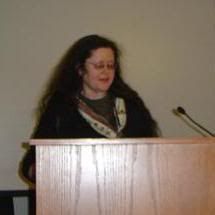
Roslyn Blyn-LaDrew: Celtic and Back Again: Translation of
The Hobbit into Irish and Breton
Roslyn’s paper was more extemporaneous than any of the others, by far the loosest in its presentation. It seemed she was not reading a paper but rather improvising to a series of outlined points. But while this offers flexibility, it suffers from a lack of organization or a clearly defined agenda. The Irish translation of
The Hobbit, moreover, has not yet been published, severely limiting what Roslyn was able to say about it. The paper was also as much about Rowling’s Harry Potter books as it was about
The Hobbit — the upshot being that the Celtic languages seem always to be bringing up the rear in translation nowadays. One reason, Roslyn supposes, is the preference for publishing the works of native authors; another must be the dearth of native speakers. The total speakers for all six of the modern Celtic languages combined are less than the numbers for Esperanto, for heaven’s sake! What I really missed from Roslyn’s presentation was some assessment of the approaches taken by Celtic translators (or translator — since only the Breton has been published) in handling Tolkien’s works, and especially his nomenclature. How successful were they? But this is obviously an inchoate field; no doubt we will learn more in the coming years.
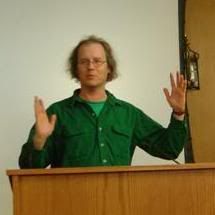
Jamie Williamson: Tolkien’s Use of Traditional Narrative Genre Forms
Despite its rather generic-sounding title, Jamie’s paper turned out to be quite interesting. Jamie is a good, confident speaker — who uses more physical gestures than anybody I’ve ever seen. He can’t seem to stand still! And his enthusiasm is infectious! This paper was essentially a systematized catalog of Tolkien’s various major sorts of narrative forms leading up to the “novel period” (that is, prior to
The Lord of the Rings and up through the time of
The Hobbit), together with their analogues in the medieval tradition. Primarily, these analogues are Old Norse; however, Jamie mentions several Classical sources as well: the Pentateuch, Apollodorus, Ovid, and others. Jamie might have dug deeper into the whys and wherefores, as well as venturing to draw some conclusions about what literary effects Tolkien achieved by drawing on this diverse selection of antecedent narrative forms. But the paper was good, well articulated, and interesting.

Marjorie Burns (KEYNOTE): Night-wolves, Half-trolls, and the Dead Who Won’t Stay Down: The Saga Supernatural in Tolkien’s Middle-earth
Marjorie’s keynote address dovetailed nicely with some of the day’s earlier papers —particularly with those of Anna Smol, Ed Risden, and Jamie Williamson. Marjorie is an excellent speaker, very comfortable both reading a paper well and interjecting appropriate spontaneously improvised asides — as a keynote speaker should. In essence, her job is to draw together all of the various threads of the day’s work and refocus them on the conference theme. This, she did admirably. Her paper focused predominantly on the Norse Sagas, covering three broad species of monster: wolves, trolls, and “afterwalkers” (that is, the dead, or undead,
geists of the Norse tradition). I have a full page of notes on her paper, but I won’t attempt to transcribe them here. Suffice to say, there was much to provoke thought and further research, and we had a stimulating Q&A afterwards (tired though we all were after the full day of papers). I also learned more about her current writing projects — a topic for a future post, as this conference report has already grown quite long enough.
* With one notable exception!
 For you of you who haven’t heard of the Reading Room at TheOneRing.net — known affectionately as TORn, you’re really missing out. Though a lot of the content on TORn focuses on the films — indeed, I believe it was because of the films that TORn was created in the first place (as an aggregator site for pre-release rumors) — the Reading Room is the place for book purists! At any given time, a book discussion of some sort is always underway. Since late last year, it’s been The Lord of the Rings again. The Reading Room works its collective way through a chapter a week, each chapter discussion being led by a volunteer member of the group. It’s like communism, only with Elves. ;)
For you of you who haven’t heard of the Reading Room at TheOneRing.net — known affectionately as TORn, you’re really missing out. Though a lot of the content on TORn focuses on the films — indeed, I believe it was because of the films that TORn was created in the first place (as an aggregator site for pre-release rumors) — the Reading Room is the place for book purists! At any given time, a book discussion of some sort is always underway. Since late last year, it’s been The Lord of the Rings again. The Reading Room works its collective way through a chapter a week, each chapter discussion being led by a volunteer member of the group. It’s like communism, only with Elves. ;)














